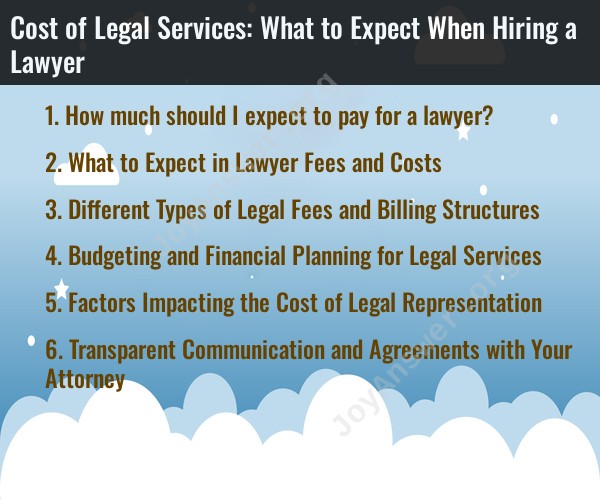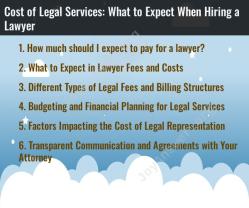How much should I expect to pay for a lawyer?
The cost of hiring a lawyer can vary widely depending on several factors, including the type of legal services you need, the complexity of your case, the lawyer's experience and expertise, and your geographical location. Here are some factors to consider when trying to estimate how much you should expect to pay for legal services:
Type of Legal Service:
- The cost of legal services can vary significantly based on the type of legal work required. For example, basic document review may cost less than complex litigation, corporate transactions, or criminal defense.
Hourly Rates:
- Many lawyers charge by the hour. Hourly rates can range from $100 to $1,000 or more per hour, depending on the attorney's experience and the complexity of the case. Some lawyers have different rates for different types of work.
Flat Fees:
- Some lawyers offer flat-fee arrangements for specific legal services, such as drafting a will, handling a simple divorce, or providing a real estate closing. Flat fees can provide cost certainty for the client.
Contingency Fees:
- In personal injury cases and some other civil cases, lawyers may work on a contingency fee basis. This means they only get paid if they win your case, and their fee is typically a percentage of the amount you recover.
Retainers:
- In some cases, you may be required to pay a retainer upfront, which is a deposit against future legal services. The lawyer will bill against the retainer as they work on your case.
Geographical Location:
- The cost of legal services can vary by region. Lawyers in major metropolitan areas often charge higher fees than those in smaller towns and rural areas.
Experience and Expertise:
- Highly experienced or specialized lawyers may charge higher fees than newer or general practice attorneys.
Case Complexity:
- More complex legal issues require more time and effort, which can lead to higher legal fees. Factors such as the number of parties involved, the amount of evidence, and the potential for appeals can impact costs.
Additional Costs:
- Be aware of additional costs, such as court filing fees, expert witness fees, and travel expenses, which may be incurred in your case.
Communication and Transparency:
- It's important to have open and clear communication with your attorney about their fees, how they bill, and what services are included in their fee structure.
Legal Aid and Pro Bono Services:
- If you cannot afford a lawyer, you may be eligible for legal aid services or pro bono representation, which are provided by attorneys for free or at reduced rates to individuals with low incomes.
To determine the cost of hiring a lawyer, it's advisable to consult with multiple attorneys, discuss your specific legal needs, and obtain fee estimates and billing structures. Keep in mind that legal fees are an investment in obtaining professional advice and representation, and the cost can vary based on the unique circumstances of your case.
What to Expect in Lawyer Fees and Costs
Lawyer fees and costs can vary widely depending on the nature of the legal matter, the complexity of the case, the experience and reputation of the lawyer, and the geographic location. However, there are some general things you can expect when budgeting for legal services:
- Hourly fees: Many lawyers charge an hourly rate for their services. The hourly rate can range from a few hundred dollars to several thousand dollars, depending on the factors mentioned above.
- Flat fees: Some lawyers charge a flat fee for certain types of legal matters, such as uncontested divorces or simple wills. A flat fee is typically agreed upon in advance and covers all of the lawyer's services, including court costs and other expenses.
- Contingency fees: Contingency fees are typically charged in personal injury cases. Under a contingency fee arrangement, the lawyer only gets paid if the client wins the case. The fee is typically a percentage of the client's winnings, ranging from 33% to 40%.
In addition to lawyer fees, you may also be responsible for other costs associated with your legal matter, such as court filing fees, expert witness fees, and travel expenses.
Different Types of Legal Fees and Billing Structures
In addition to the three main types of legal fees mentioned above, there are a few other less common billing structures:
- Retainer fees: A retainer fee is a deposit that is paid to the lawyer upfront. The lawyer will then deduct their hourly fees from the retainer fee as they work on the case.
- Blended rates: Some lawyers charge a blended rate, which is a combination of an hourly rate and a flat fee. This type of billing structure can be beneficial for cases that involve a mix of routine and complex tasks.
- Success bonuses: Some lawyers charge a success bonus in addition to their hourly fee or contingency fee. A success bonus is typically paid if the client achieves a favorable outcome in their case.
Budgeting and Financial Planning for Legal Services
It is important to budget and plan financially for legal services. Here are a few tips:
- Get an estimate: Before you hire a lawyer, ask them for an estimate of the total cost of their services. This will help you to budget and plan accordingly.
- Discuss payment options: Be sure to discuss payment options with your lawyer before you start working together. Many lawyers offer payment plans or other flexible billing options.
- Keep track of your expenses: If you are billed on an hourly basis, keep track of all of your communications with your lawyer, including phone calls, emails, and meetings. This will help you to ensure that you are being billed fairly.
Factors Impacting the Cost of Legal Representation
The cost of legal representation can be impacted by a number of factors, including:
- The nature of the legal matter: Some types of legal matters, such as complex business litigation or medical malpractice cases, are typically more expensive than others.
- The complexity of the case: More complex cases will typically require more time and resources from the lawyer, which can lead to higher fees.
- The experience and reputation of the lawyer: More experienced and reputable lawyers typically charge higher fees.
- The geographic location: Lawyers in major cities typically charge higher fees than lawyers in smaller towns and rural areas.
Transparent Communication and Agreements with Your Attorney
It is important to have transparent communication with your attorney about the cost of their services. You should also have a written agreement in place that outlines the lawyer's fees and billing structure. This will help to avoid any surprises down the road.
If you have any questions or concerns about your lawyer's fees, be sure to ask them. The lawyer has a duty to provide you with clear and concise information about their fees and billing structure.
Here are some additional tips for communicating and working with your lawyer:
- Be honest and upfront about your financial situation.
- Be clear about your goals and expectations for the case.
- Be responsive to your lawyer's requests for information.
- Ask questions if you do not understand something.
- Be patient and understanding. Legal cases can take time and effort to resolve.
By following these tips, you can ensure a smooth and productive relationship with your lawyer and minimize the financial burden of legal representation.



